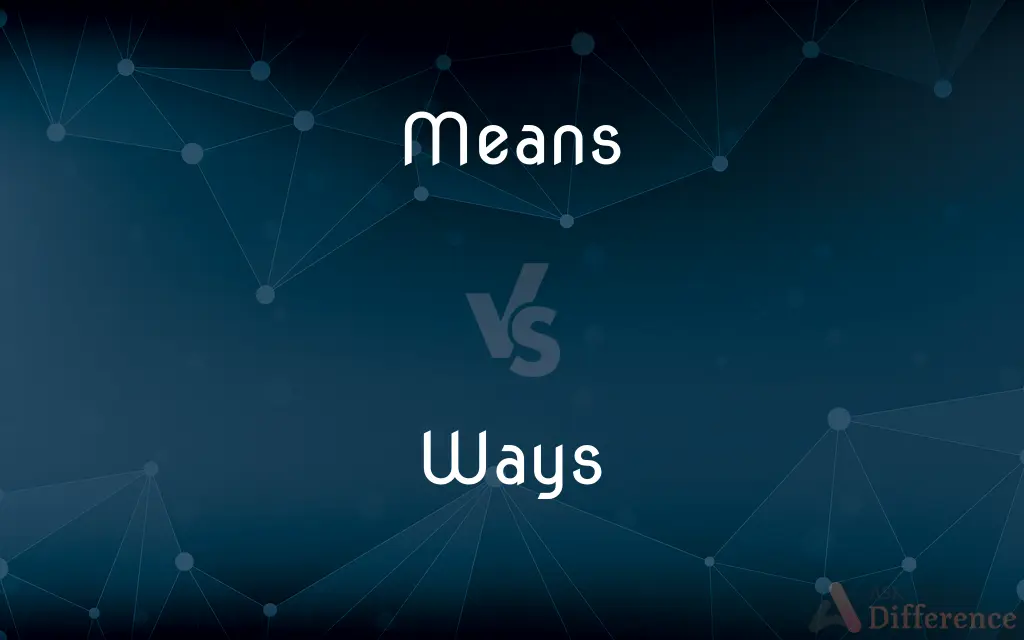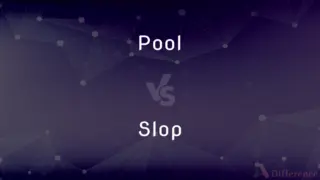Means vs. Ways — What's the Difference?
Edited by Tayyaba Rehman — By Urooj Arif — Updated on April 4, 2024
Means refers to resources or methods available for achieving an objective, while ways are specific strategies or approaches to reach a goal.

Difference Between Means and Ways
Table of Contents
ADVERTISEMENT
Key Differences
Means typically involve the resources or methods at one’s disposal to accomplish a goal. This can include financial resources, tools, or skills. For example, having the means to travel could involve financial resources for tickets and accommodations. On the other hand, ways are more about the strategies or approaches one might take to achieve an end. Finding a way to solve a problem might involve brainstorming different approaches or methodologies, regardless of the resources available.
While means often imply the capability or resources necessary for an action, ways emphasize the manner or direction taken to achieve an outcome. Having the means to purchase a house speaks to one's financial resources, whereas finding a way to purchase a house could involve strategies such as saving, investing, or seeking a loan. Ways, therefore, are more focused on the procedural or strategic aspects rather than the availability of resources.
Means can also denote instruments or methods used to achieve an end, highlighting the practical aspects necessary for an objective. For instance, a hammer and nails are means to hang a picture frame. Conversely, ways could refer to the different techniques or strategies one could use to hang the picture frame securely, like finding the stud in the wall or using a hanging wire.
The concept of means is often associated with the idea of ability or power to do something, linked closely to material or tangible resources. This contrasts with ways, which are more aligned with concepts, plans, or routes to achieve something, often incorporating creativity and adaptability. For instance, having the means to start a business focuses on the capital, while finding ways to make it successful could include marketing strategies, networking, or product development.
Means and ways, though related in the pursuit of goals, differ in focus: means being the resources or methods available, and ways being the specific strategies or approaches employed. This distinction is crucial in planning and execution, as having the means does not guarantee success without finding effective ways to utilize those means towards achieving desired objectives.
ADVERTISEMENT
Comparison Chart
Definition
Resources or methods available for achieving an objective.
Specific strategies or approaches to reach a goal.
Focus
Capability or resources necessary for an action.
Manner or direction taken to achieve an outcome.
Example
Financial resources for travel.
Saving, investing, or seeking a loan to purchase a house.
Association
Material or tangible resources.
Concepts, plans, or routes.
Outcome
Having the tools or resources.
Employing specific strategies or methodologies.
Compare with Definitions
Means
Instruments or methods used.
Digital marketing is a means to reach a wider audience.
Ways
Incorporates creativity.
Creative ways of teaching can enhance student engagement.
Means
Material or tangible resources.
Access to clean water is a basic means of maintaining health.
Ways
Focus on procedural aspects.
There are several ways to apply for college scholarships.
Means
Resources for achieving goals.
His inheritance provided the means for his education.
Ways
Manner or direction.
He found innovative ways to market his product.
Means
Associated with ability.
Financial stability offers the means to live comfortably.
Ways
Emphasizes adaptability.
Finding new ways to adapt to changes is crucial for businesses.
Means
Capability or power.
The scholarship gave her the means to attend the university.
Ways
Strategies or approaches.
Exploring different ways to solve the puzzle can be enlightening.
Means
An action or system by which a result is achieved; a method
Resolving disputes by peaceful means
Technology seen as a means to bring about emancipation
Ways
Plural of way
Means
Financial resources; income
A woman of modest but independent means
Ways
A distance.
A little ways out
Means
To be used to convey; denote
"'The question is,' said Alice, 'whether you can make words mean so many different things'" (Lewis Carroll).
Ways
The property of distance in general;
It's a long way to Moscow
He went a long ways
Means
To act as a symbol of; signify or represent
In this poem, the budding flower means youth.
Ways
Structure consisting of a sloping way down to the water from the place where ships are built or repaired
Means
To intend to convey or indicate
"No one means all he says, and yet very few say all they mean, for words are slippery and thought is viscous" (Henry Adams).
Ways
N is between 2 and infinity;
They split the loot four ways
Means
To have as a purpose or an intention; intend
I meant to go running this morning, but I overslept.
Means
To design, intend, or destine for a certain purpose or end
A building that was meant for storage.
A student who was meant to be a scientist.
Means
To have as a consequence; bring about
Friction means heat.
Means
To have the importance or value of
The opinions of the critics meant nothing to him. She meant so much to me.
Means
To have intentions of a specified kind; be disposed
They mean well but lack tact.
Means
Something having a position, quality, or condition midway between extremes; a medium.
Means
A number that typifies a set of numbers, such as a geometric mean or an arithmetic mean.
Means
The average value of a set of numbers.
Means
(Logic) The middle term in a syllogism.
Means
Means (used with a sing. or pl. verb) A method, a course of action, or an instrument by which an act can be accomplished or an end achieved.
Means
Money, property, or other wealth
You ought to live within your means.
Means
Great wealth
A woman of means.
Means
Occupying a middle or intermediate position between two extremes.
Means
Intermediate in size, extent, quality, time, or degree; medium.
Means
Plural of mean
Means
An instrument or condition for attaining a purpose.
She treated him as a means to an end.
A car is a means of transport.
Means
(uncountable) Resources; riches.
A person of means;
Independent means
He was living beyond his means.
Means
How a result is obtained or an end is achieved;
A means of control
An example is the best agency of instruction
The true way to success
Means
Instrumentality used to achieve an end
Means
Considerable capital (wealth or income);
He is a man of means
Common Curiosities
What is the difference between means and ways?
Means refers to the resources or methods available for a goal, while ways are the strategies or approaches employed.
How do means and ways relate to problem-solving?
Means provide the resources for problem-solving, whereas ways represent the different strategies or methodologies to solve the problem.
How do means and ways interact in business?
In business, means could be the capital and resources, while ways could be the business models or strategies employed for success.
Can ways exist without means?
While ways can be conceptualized without means, practical application often requires some means for implementation.
How does one identify the best means and ways?
Through research, experimentation, and analysis of goals and available resources, one can identify optimal means and ways.
Can the same means lead to different ways?
Yes, the same set of means can inspire various ways or strategies to achieve a goal, depending on creativity and perspective.
Are means more important than ways?
Both are essential in different contexts; means provide the capacity, while ways determine the effectiveness of achieving goals.
Are ways more flexible than means?
Generally, ways are more flexible as they involve strategies and approaches that can adapt to changing circumstances or resources.
How do means and ways contribute to success?
Success often requires both: the means to get started or continue and the ways to navigate towards objectives efficiently.
Is financial stability a means or a way?
Financial stability is considered a means, as it provides the resources necessary for various actions or objectives.
How do cultural differences impact means and ways?
Cultural contexts can influence the perception of viable means and preferred ways to approach challenges or opportunities.
Can ways influence the identification of means?
Yes, exploring different ways can sometimes reveal or necessitate new means to achieve an objective.
Is education a means or a way?
Education can be seen as a means, providing the knowledge and skills necessary for various goals.
Can ways become means?
In some contexts, innovative ways can turn into means for future endeavors, especially if they establish new resources or methodologies.
Do means and ways change over time?
Yes, both can evolve with new technologies, resources, insights, and changing objectives.
Share Your Discovery

Previous Comparison
Creep vs. Slither
Next Comparison
Pool vs. SlopAuthor Spotlight
Written by
Urooj ArifUrooj is a skilled content writer at Ask Difference, known for her exceptional ability to simplify complex topics into engaging and informative content. With a passion for research and a flair for clear, concise writing, she consistently delivers articles that resonate with our diverse audience.
Edited by
Tayyaba RehmanTayyaba Rehman is a distinguished writer, currently serving as a primary contributor to askdifference.com. As a researcher in semantics and etymology, Tayyaba's passion for the complexity of languages and their distinctions has found a perfect home on the platform. Tayyaba delves into the intricacies of language, distinguishing between commonly confused words and phrases, thereby providing clarity for readers worldwide.














































